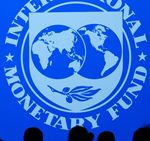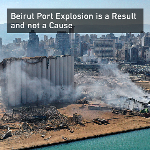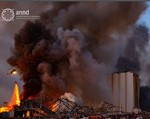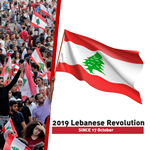Lebanon
Published on Wed, 2025-08-06 19:22
Call for Applications: Apply Now for the 2025 Global South Study Week in Beirut, Lebanon Deadline: August 20, 2025 Are you a young civil society activist from the Global South working on development, macroeconomic issues, multilateralism, governance, gender, climate, digital justice? |
Published on Mon, 2024-05-13 00:00
As part of the 2024 Global South Study Week on Sustainable Human Development, Arab NGO Network for Development (ANND), Third World Network (TWN), The Asfari Institute for Civil Society and Citizenship, Global Policy Forum and Social Watch invite you to a special session: “On the Way to the Summit of the Future: The Challenges of the Multilateral System.” This hybrid event will explore critical global issues and the efficacy of multilateralism in addressing them. |
Published on Tue, 2020-10-06 00:00
More than 500 organisations and academics from 87 countries have issued a statement today calling on the International Monetary Fund (IMF) to stop promoting austerity and instead support policies that advance gender justice, reduce inequality, and put people and planet first. The IMF has already begun locking some countries into long term austerity-conditioned loans, while encouraging countries to take such recovery measures through its short-term, front loaded emergency financing packages. Such policies will further entrench gender and economic inequality and undermine any chance of an inclusive recovery, especially as many countries in the Global South are expected to need more long-term financing in the near future. |
Published on Mon, 2020-10-05 00:00
We are please to invite to attend their join side event during the Civil Society Policy Forum at the 2020 IMF-WB Annual Meetings, entitled: “The Role of IFIs in a World of Intersecting Conflicts and Crises”. This session will assess IFIs’ policies in contexts of crises and conflicts, mainly in the Arab region, by examining the existing policies and their impact on inequality. It aims also to look into countries with ongoing IMF negotiations, in light of country specific contexts, such as the economic failure in Lebanon and the inability to negotiate, and the case of emergency lending in Egypt. Finally, it will assess IMF policies on a regional level as they relate to the effect of the pandemic. |
Published on Tue, 2020-09-15 10:59
The explosion on the 4th of August was heard in Cyprus and felt in Jordan, where it registered an earthquake of 4.4 magnitude. It was considered the third strongest explosion after Hiroshima and Nagasaki. It was a result of several factors, which could be seen as a precursor and a cause. First was the stifling economic crisis that began in the summer of 2016, but worsened in the summer of 2019. Lebanon began to suffer from a deficit in the budget, the treasury, and the balance of payments. |
Published on Thu, 2020-08-13 14:35
Statement prepared by Lebanese CSOs after Beirut’s Explosion, the statement is addressed to International Organizations, the United Nations Agencies and International Partners. On August 4, 2020, Beirut was hit by the biggest explosion in its history, leading to more than 200 killed, seven thousand wounded, and tens of missing (according to the latest figures by the Ministry of Public Health) before the Lebanese army announced that it would stop the search for the missing in addition to causing disabilities and increasing the suffering of people with disabilities in general. |
Published on Thu, 2020-05-14 12:11
The COVID-19 health crisis added to the multidimensional crises in the Arab region and their manifestation in conflicts, wars, economic and social inequalities, and the increasing number of refugees and migrants. It could lead to severe repercussions at the economic, social, and political levels. According to an ESCWA preliminary estimate, the region will lose at least USD42 billion in 2020 due to the Corona pandemic. ESCWA also considered that the global spread of the virus and the growing impact of low oil prices could aggravate income losses. Unemployment is expected to increase by 1.2 percentage points, meaning the loss of around 1.7 million jobs. The Arab region registers some of the highest rates of inequality around the world, and informal employment accounts for 50% of jobs. It also lacks universal social protection systems and is thus unable to protect workers and ensure their dignity during work stoppages. |
Published on Thu, 2020-04-23 09:33
Ziad Abdel Samad Never has the world witnessed such a state of panic, not even in world wars, where vast areas remained relatively safe. But the current Corona epidemic seems like a state of global war that will not exclude anyone or any region of this planet. Countries have closed their borders and airports, stopped their railways, and reduced the movement of shipping. Regions inside the same state were isolated and citizens voluntarily quarantined in an unprecedented manner. Distance education has become the way to complete the academic year, depending on the infrastructure required to communicate via the Internet and appropriate applications. |
Published on Sun, 2020-04-12 00:00
Civil Society Organizations and Research Center in Lebanon released a statement in reaction to the Government response to the Covid 19 crisis. |
Published on Fri, 2020-02-07 08:56
The formation of the new Lebanese government on 21 January 2020, nearly one hundred days after the eruption of the popular protests, is an important milestone in the first stage of the confrontation between the “revolution” and the authorities. This has raised questions and discussions among activists and groups whether the revolution has made progress, or the formation of the government constitutes a return to the bottom, to pre 17 October period. So what has the revolution achieved against the regime? Indeed, the revolution has had accomplishments on two levels, the authorities’ and popular levels. |
SUSCRIBE TO OUR NEWSLETTER











